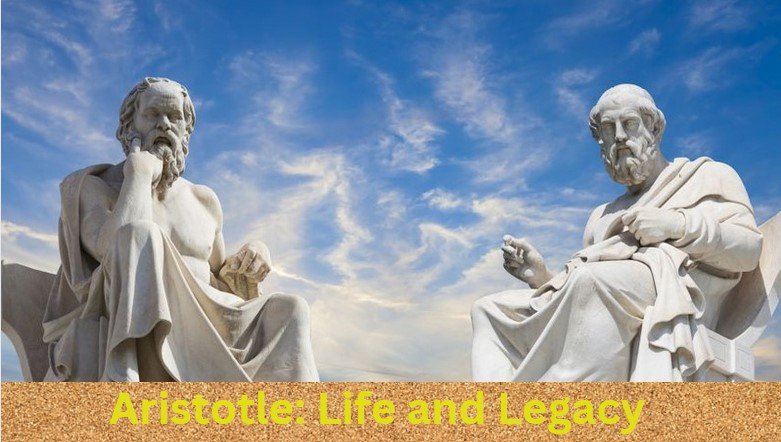Aristotle (384–322 BCE) was a philosopher from ancient Greece and was often referred to as ‘The man who knew everything’ and more commonly ‘The Philosopher’. He invented a methodical approach to science in nearly every field. Aristotle wrote multiple books on a wide range of subjects and was regarded as an expert because his works included biology, politics, and most importantly philosophy. He also worked on literature, mathematics, physics, logic, and theater and became a prominent figure in the literary world. Aristotle is regarded as one of the three greatest Greek philosophers, together with Socrates and Plato and is adored all over the world even to this day.
Early Life
In the year 384 BCE Aristotle was born in the city of Stagira. He grew up in that place and studied various subjects until he turned seventeen and wanted to join the Academy that Plato, the great philosopher, ran at that time. After the passing of Plato just like many other students of that institution Aristotle too decided to leave and he chose Assos and moved there in 347 BCE. There he started his studies into biology, while continuing the philosophical work. After spending three years in Assos, Aristotle relocated to Lesbos. For two more years, he carried out his philosophical studies with the assistance of Theophrastus. Aristotle married Pythias while he was living in Lesbos.
Influence on Alexander the Great
Aristotle was Alexander the Great’s private tutor, hired by the then King who was Alexander’s father. He taught Alexander for seven years. In 336 BCE Alexander became the King and started his conquests. Aristotle returned to Athens by 335 BCE, but they kept in touch. Alexander’s diplomatic management of political issues was Aristotle’s influence. Aristotle also influenced Alexander’s love of reading and his habit of bringing books on campaigns. Aristotle supported Alexander’s conquests because he despised Persians and non-Greeks.
Famous Works
The Prime Mover and the Golden Mean are Aristotle’s most famous philosophical works. However, Aristotle contributed to every field of knowledge. He examined the distinction between voluntary and involuntary behavior. He advised individuals to live a happy life by engaging in many voluntary activities. Aristotle acknowledged that there were a lot of tasks that one would prefer to avoid. But he advised looking at these inconveniences as paths to happiness. He was fascinated about the natural world and human predicament. Aristotle methodically researched every subject that caught his attention. He then used philosophical interpretation to make it meaningful. He created a hypothesis and verified it with an experiment. This is how he made an early version of the Scientific Method.
Metaphysics is one of the most studied writings of Aristotle and he covered a variety of subjects in these Metaphysics writings. Metaphysics opens with a treatment of epistemology. This is because of the tight link between epistemology and knowledge of philosophy. According to Aristotle, wisdom is the most basic type of knowledge. Wisdom is gained from observation.
Aristotle’s Poetics is the philosophy of beauty and art. Aristotle was not the first philosopher to study art but Poetics offers a methodical approach to the topic. The Poetics is divided into five primary sections. The first section is the breakdown of poetry forms. It studies the differences between the epic, tragedy, and comedy. After that, the definition of tragedy is covered. It explains its composition and the impact it has on the audience. It also discussed the concept of “catharsis.”
The Nicomachean Ethics is the work of Aristotle on moral issues. Aristotle states the greatest good that humans may achieve. He uses the ancient Greek term “eudaimonia”, which means something in between “human flourishing” and “happiness”.

Aristotle’s Politics is insightful. He explored the numerous ways the political world interacts with other social units. Aristotle discussed if a government can be seen as a kind of expansion of the principles of household rules. He asked if the king is to the city as the father is to his household. This has piqued the intellectual interest of many contemporary philosophers.
Another one of Aristotle’s most influential works is De Anima. It is partly because of its remarkable impact on theologians. It contributed to the evolution of contemporary philosophy. According to Aristotle, every living creature possesses a soul. He said having a soul identifies one as a living being. He also argued the ability to understand distinguishes humans from other living creatures.
Death and Legacy
Aristotle died in 322 and the Lyceum was taken over by Aristotle’s preferred pupils. But in a few decades the academy diminished. Aristotle’s writings were virtually forgotten for some centuries. The historian Strabo claims that Aristotle’s writings were kept for decades in a damp dungeon in Asia Minor. They were found again in the first century B.C. It is improbable that these were the sole copies of his works.
Andronicus of Rhodes collected and edited Aristotle’s surviving writings. He did that in about 30 BC. This is how he created the framework for all new editions. Aristotle continued to be studied in Byzantium after the fall of Rome. Later, his logical and scientific ideas were revived by other scholars such as Avicenna, Averroes, and the philosopher Maimonodes.










